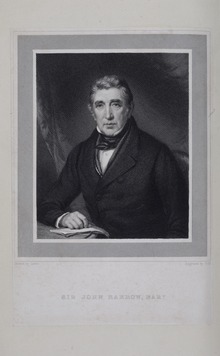Sir John Barrow, 1st Baronet
|
Sir John Barrow Bt FRS FRGS |
|
|---|---|
 |
|
| Born |
John Barrow 19 June 1764 Ulverston, Lancashire,England, Great Britain |
| Died | 23 November 1848 (aged 84) London, England, UK |
| Nationality | English |
| Occupation | statesman, writer |
| Spouse(s) | Anna Maria Truter |
Sir John Barrow, 1st Baronet, FRS, FRGS (19 June 1764 – 23 November 1848) was an English and writer.
Barrow was born the only child of Roger Barrow, a tanner in the village of Dragley Beck, in the parish of Ulverston, Lancashire. He was schooled at Town Bank School, Ulverston, but left at age 13 to found a Sunday school for the poor.
In 1765, Barrow was employed as superintending clerk of an iron foundry at Liverpool. At only 16, he went on a whaling expedition to Greenland. By his twenties, he was teaching mathematics, in which he had always excelled, at a private school in Greenwich.
Barrow taught mathematics to the son of Sir George Leonard Staunton; through Staunton's interest, he was attached on the first British embassy to China from 1792–94 as comptroller of the household to Lord Macartney. He soon acquired a good knowledge of the Chinese language, on which he subsequently contributed articles to the Quarterly Review; and the account of the embassy published by Sir George Staunton records many of Barrow's valuable contributions to literature and science connected with China.
Barrow ceased to be officially connected with Chinese affairs after the return of the embassy in 1794, but he always took much interest in them, and on critical occasions was frequently consulted by the British government.
In 1797, Barrow accompanied Lord Macartney as private secretary in his important and delicate mission to settle the government of the newly acquired colony of the Cape of Good Hope. Barrow was entrusted with the task of reconciling the Boer settlers and the native Black population and of reporting on the country in the interior. In the course of the trip, he visited all parts of the colony; when he returned, he was appointed auditor-general of public accounts. He then decided to settle in South Africa, married, and bought a house in 1800 in Cape Town. However, the surrender of the colony at the peace of Amiens (1802) upset this plan.
...
Wikipedia
